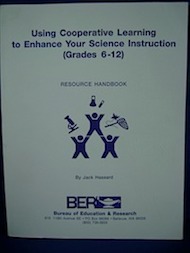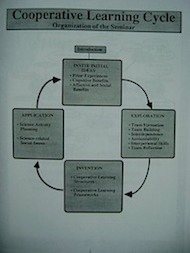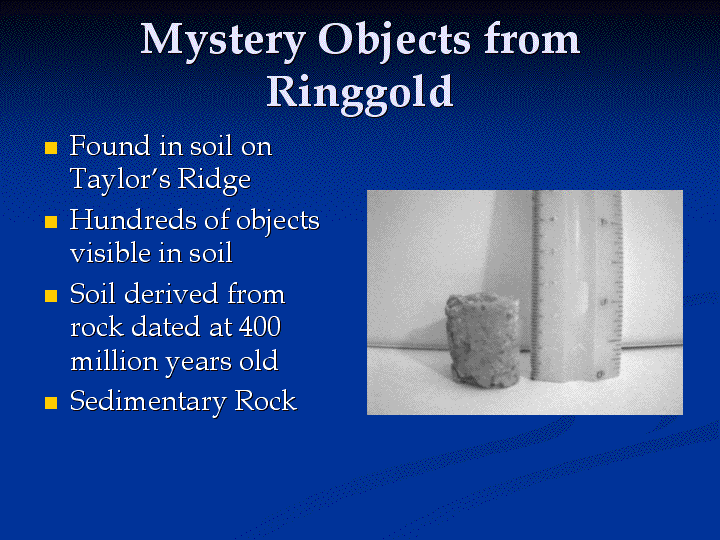In 1990, Stewart Brewster, director of the Innovative Division of Addison-Wesley published my book Science Experiences: Cooperative Learning and the Teaching of Science. That summer, I was in Baltimore attending an international gifted conference, and after I finished presenting a workshop on cooperative learning, I was approached by Frank Koontz, program director of the Bureau of Education and Research (BER) in Belleview, Washington. He indicated he was interested in having me develop a one-day seminar on cooperative learning for science teachers grades 6 –12. This meant designing a one-day workshop, and designing a handbook for the participants. Over the next three months, I worked with Dr. Koontz to develop the seminar and handbook, and it resulted in a seminar entitled: Using Cooperative Learning to Enhance Your Science Instruction.For the next 12 years I was fortunate to be able to present seminars around the nation for the Bureau, and during that time not only presented the cooperative learning seminar but also the following seminars for the BER to thousands of science teachers around the nation:
- Increasing Your Students Science Achievement: Using the Internet, Active Learning, Project-Based and Performance Based Assessment Strategies
- Using the Internet as an Effective Science Teaching Tool
- Accelerating Science Achievement for Every Student: Using Differentiated Instruction, Inquiry-Based Science Projects and Other High-Impact Strategies in Your Science Classroom
By presenting seminars for the BER I learned a great deal about humility and the importance of teaching based on educational theory, but with the emphasis on practical strategies and techniques that can be immediatly implemented in science teachers' classrooms. Each seminar participant received an extensive resource handbook which included key handbouts, guidelines, and sample materials based on the content of the seminar. On the last page of the handbook was an evaluation form that participants completed, and turned in at the registration table. There were four statements which participants rated on a 7-point scale. The first two were the most significant: Please rate the seminar by circling the appropriate numbers:
- Content of the seminar
- Contribution of the instructor
Nearly all of the participants completed these evaluations, and each seminar program was guaranteed with this phrase: "We stand behind every program we produce. If a participant is not satisfied with a training program, we provide a 100% refund of the fee." (By the way, my first seminar was in Indianapolis, and there were about 170 teachers in attendance; only two asked for their money back. After my first seminar, no one asked for a refund!
Furthermore, in order to continue doing seminars for the BER, your evaluations of the two key evaluation statements had to average 6.5 or higher.
By presenting these seminars, I learned the art of teaching professional teachers in large group environments large groups (~100 – 200). My goal was to create an active learning environment that fostered a humanistic science approach to teaching. This was accomplished by implementing a inquiry-oriented learning model, and working with the teachers as members of small-collaborative learning teams. Through the seminars I developed many hands-on, minds-on activities designed to engage teachers in an interesting experiences that were grounded in theory, but resulted in practical strategies that the teachers I met could use in their classrooms.[ii]
The BER experience had a profound effect on my teaching at the university and the curriculum development on the Global Thinking Project, the writing of The Art of Teaching Science, and other books. Although I maintained an affinity for theory, teaching, especially in the TEEMS program, and graduate science education courses, hovered on practical strategies, and the lived experiences that students would have in their teaching career, and what the teachers brought to us from their classrooms in our graduate science education degree programs for practicing teachers.
The seminars were important in that it showed how our knowledge of teaching must be made practical and useful to professional teachers, and at the same time based on theories of learning that emerge from the thinking of John Dewey, Jerome Bruner, Jean Piaget, Ernst von Glasersfeld, Carl Rogers, and Lev Vygotsky.
[i] This seminar is available on tape from the Bureau of Education and Research at this website: http://www.ber.org/audio/ssh.cfm.
[ii] The handbooks produced for these seminars were published as a book: Jack Hassard, Science as Inquiry: Active Learning, Project-Based, Web-Assisted, and Active Assessment Strategies to Enhance Student Learning. (Tucson, AZ: Goodyear Books, 2000).


